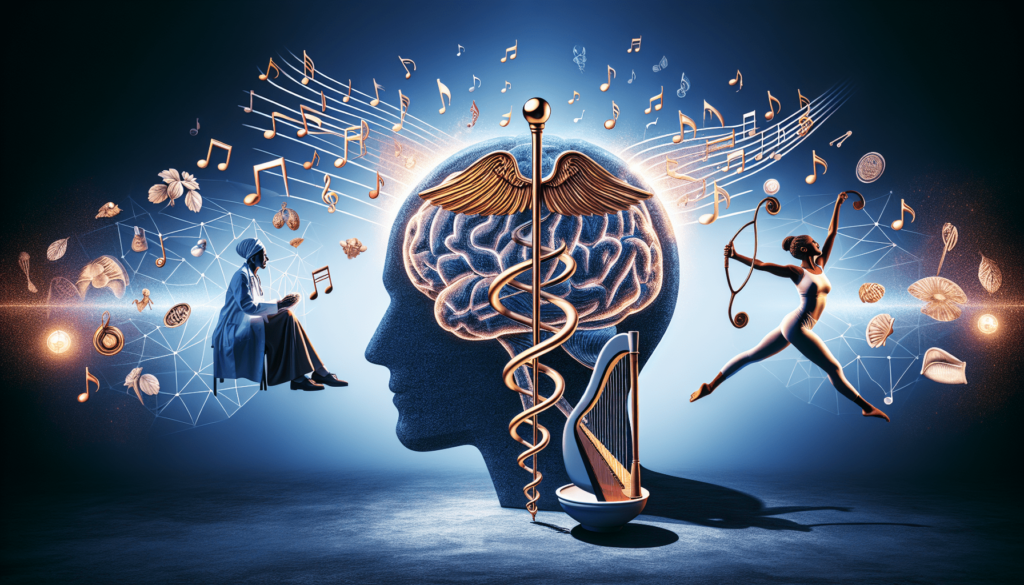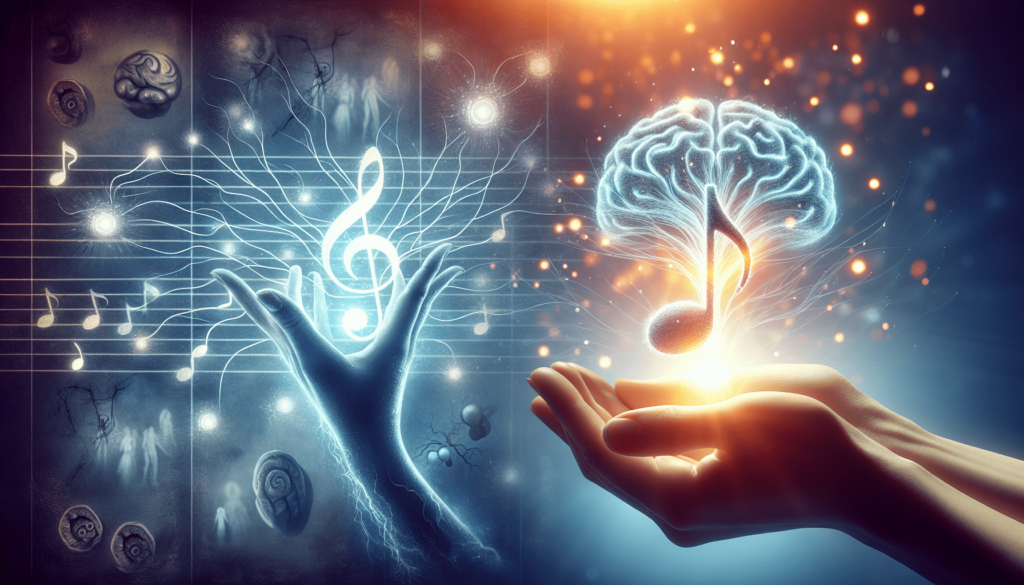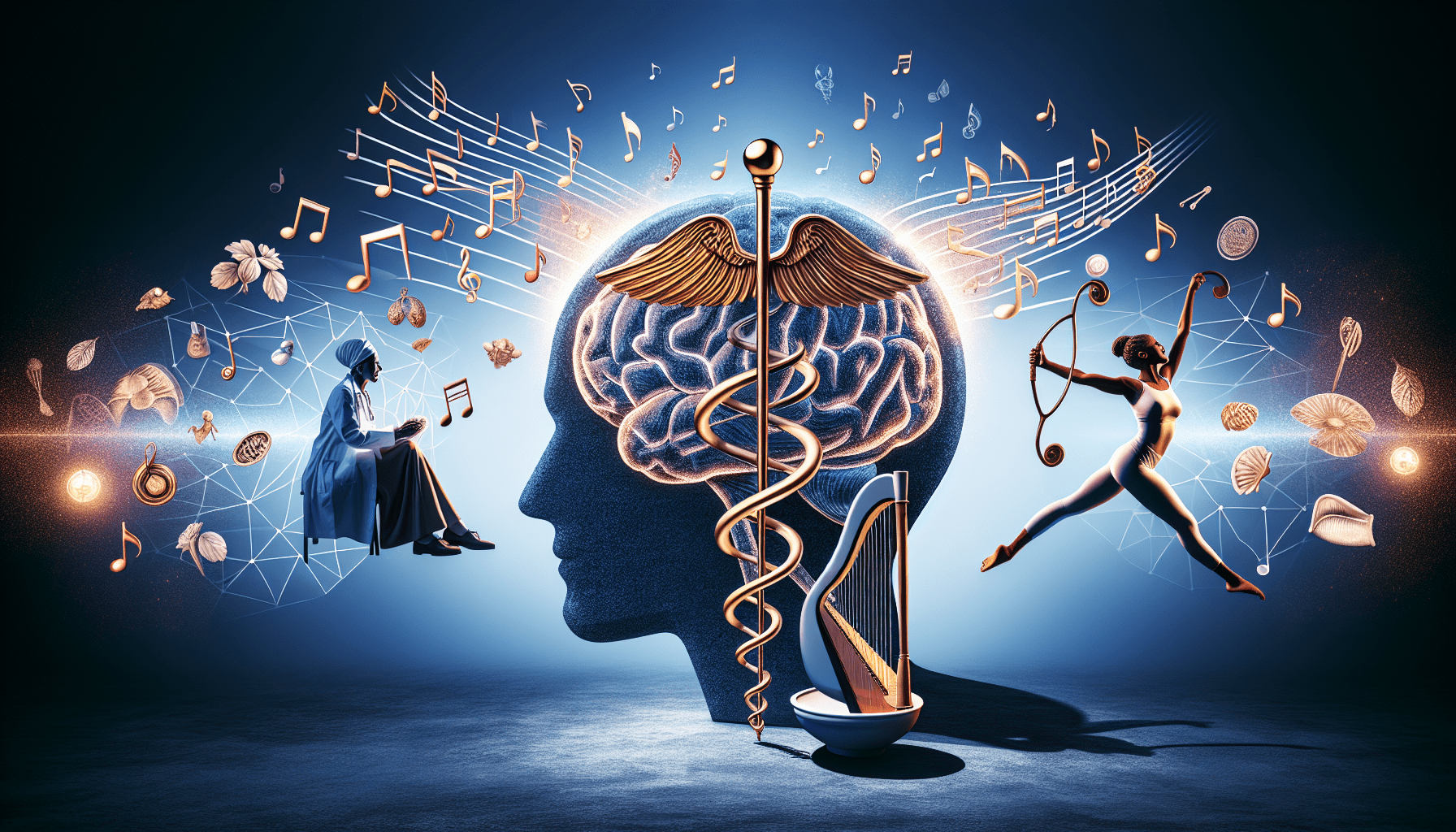Music has the incredible power to heal both the body and the soul. Whether you’re feeling stressed, anxious, or simply seeking comfort, the soothing melodies, harmonious rhythms, and heartfelt lyrics have an undeniable way of impacting our emotions. In recent years, scientific research has begun to shed light on the profound connection between music and healing, revealing how it can reduce pain, lower blood pressure, decrease anxiety, and even enhance our overall well-being. So, plug in those headphones, turn up the volume, and let the healing power of music wash over you.
Music and Emotional Healing
Music as a Form of Self-expression
Music has long been recognized as a powerful tool for emotional healing. Whether you’re singing along to your favorite song or playing an instrument, music allows you to express your emotions in a unique and tangible way. It can serve as a channel for releasing pent-up feelings, offering a safe space to convey joy, sadness, anger, or any other emotion you may be experiencing. The act of creating music can be deeply cathartic, providing a sense of relief and release.
Music as a Mood Booster
Have you ever noticed how a catchy tune can instantly lift your spirits? Music has the incredible ability to enhance our mood and boost our emotional well-being. Upbeat and joyful songs can energize and motivate you, while relaxing melodies can help soothe and calm your mind. It is no wonder that we often turn to music during difficult times, seeking solace and comfort in its melodic embrace. Whether it’s a lively anthem or a soulful ballad, music has the remarkable power to uplift our spirits and bring us joy.
Music as a Tool for Emotional Release
Emotional release is a fundamental aspect of the healing process, and music can serve as a valuable tool in this regard. Engaging with music that resonates with your emotions can help you connect with and process your feelings on a deeper level. It allows you to confront and explore your emotions in a supportive and non-judgmental way. By engaging in music, you give yourself permission to express and release emotions that may have otherwise remained buried. This release can promote emotional healing and provide a sense of clarity and relief.
Music and Physical Healing
Music’s Effect on Pain Perception
Research has shown that music can have a positive impact on pain perception. Listening to music has been found to decrease the intensity of pain experienced, making it a valuable tool in managing discomfort. When we listen to music, our brain releases endorphins, which are natural pain relievers. These endorphins can help reduce pain sensations and act as a distraction from physical discomfort.
Music as a Distraction from Pain
One of the ways music promotes physical healing is by serving as a distraction from pain. By shifting our attention to the music, we can redirect our focus away from the sensations of pain. This distraction mechanism can be particularly effective during medical procedures or rehabilitation exercises, where music can help individuals endure discomfort with greater ease. The rhythmic and melodic qualities of music can engage our senses and provide an alternate focus, helping to alleviate physical discomfort.
Music’s Impact on Heart Rate and Blood Pressure
Beyond pain relief, music has been found to have a tangible effect on vital signs such as heart rate and blood pressure. Research has shown that listening to calming and soothing music can lower heart rate and blood pressure, promoting a state of relaxation. By inducing a sense of calm, music can help reduce stress levels and support cardiovascular health. These physiological changes can contribute to physical healing and overall well-being.

Music and Cognitive Healing
Music’s Influence on Memory Recall
Music has a unique ability to evoke memories and stimulate memory recall. Have you ever heard a song that instantly transported you back to a specific moment in time? This phenomenon is due to the powerful connection between music and memory. Studies have shown that music can enhance memory recall, particularly for individuals with neurological conditions such as Alzheimer’s disease and dementia. The rhythmic and melodic patterns present in music can bypass cognitive impairments and activate areas of the brain associated with memory storage.
Music as a Stress Reducer
Stress has a profound impact on our cognitive function, and music can serve as an effective stress reducer. Engaging with music can lower stress levels by decreasing the production of stress hormones such as cortisol. The soothing and rhythmic qualities of music promote a state of relaxation, reducing anxiety and enhancing cognitive function. By alleviating stress, music can support cognitive healing and improve mental clarity and focus.
Music’s Effect on Brain Function
Research has shown that engaging with music can have a positive impact on brain function. Learning to play an instrument, for example, has been found to enhance cognitive skills such as memory, attention, and problem-solving. Music engages multiple regions of the brain simultaneously, promoting neural connections and strengthening cognitive abilities. Whether actively participating in music or simply listening and engaging with it, music has the potential to enhance brain function and support cognitive healing.
Music and Mental Health Healing
Music Therapy for Depression
Depression can be a debilitating condition, but music therapy has been shown to provide relief and support in managing symptoms. Engaging in music therapy allows individuals to express their emotions and engage in a creative process, promoting self-reflection and emotional healing. Music therapy sessions often incorporate techniques such as songwriting, improvisation, and listening to emotionally resonant music, allowing individuals to explore and process their feelings in a supportive and therapeutic environment.
Music’s Role in Anxiety Reduction
Anxiety can significantly affect one’s overall well-being, but music can serve as a powerful tool in reducing anxiety levels. The calming qualities of music can help regulate breathing, slow the heart rate, and promote relaxation. Research has shown that listening to soothing music can significantly decrease anxiety levels and provide a sense of calm. Whether it’s classical compositions, nature sounds, or personalized playlists, music can help alleviate anxiety symptoms and support mental health healing.
Music as a Source of Comfort and Solace
During challenging times, music can act as a source of comfort and solace. The lyrics, melodies, and harmonies can resonate deeply with our emotions, offering a safe space for emotional exploration. Music has the ability to validate our experiences and provide a sense of connection and understanding. It can remind us that we are not alone in our struggles and that there is hope for healing. By immersing ourselves in music, we can find solace, strength, and comfort on our journey towards mental health healing.

Music and Spiritual Healing
Music’s Connection to Spirituality
Music has long been intertwined with spirituality, serving as a vehicle for connecting with the divine and accessing deeper realms of consciousness. Across various cultures and traditions, music is used in religious ceremonies, rituals, and spiritual practices, enhancing the spiritual experience and fostering a sense of connection to something greater than ourselves. The ethereal and transcendent qualities of music can evoke powerful spiritual experiences, leading to a profound sense of healing and transformation.
Music’s Ability to Induce Transcendence
Have you ever listened to a piece of music that transported you beyond the physical realm? Music has the extraordinary ability to induce transcendence, allowing us to experience a sense of heightened awareness and connection to the universe. It can evoke feelings of awe, wonder, and a deep sense of spirituality. Whether through choral harmonies, chanting, or instrumental compositions, music can guide us on a spiritual journey of self-discovery and healing.
Music as a Tool for Meditation and Mindfulness
Meditation and mindfulness practices have become increasingly popular for promoting overall well-being, and music can play a significant role in enhancing these practices. The rhythmic and melodic qualities of music can serve as an anchor for mindfulness, helping to focus and quiet the mind during meditation. In addition, serene and ambient compositions can create a conducive environment for deep relaxation and inner reflection. Incorporating music into meditation and mindfulness practices can deepen our connection to the present moment and foster spiritual healing.
Music and Social Healing
Music as a Unifying Force
Music has a unique ability to transcend cultural, linguistic, and social barriers, acting as a powerful unifying force. It has the power to bring people together, fostering a sense of unity and shared experience. Whether through communal singing, dancing, or attending concerts, music has the power to create connections and bridge divides. It can serve as a common language that surpasses differences and promotes understanding, empathy, and social healing.
Music’s Role in Community Building
In communities and societies around the world, music plays a vital role in building and strengthening social bonds. From traditional folk songs to modern anthems, music has the capacity to bring communities together and foster a sense of belonging. Whether in religious gatherings, cultural festivals, or neighborhood events, music serves as a cultural thread that weaves individuals together, creating a sense of unity and solidarity. By actively engaging with music within a community context, individuals can experience social healing and cultivate a sense of connectedness.
Music’s Impact on Social Connection and Bonding
Social connections are essential for our well-being, and music can play a significant role in forging and strengthening these connections. Playing music together, whether in a band or a choir, requires collaboration, communication, and mutual respect. In the process of creating music as a group, individuals can build trust, develop a shared sense of purpose, and create lasting bonds. Additionally, attending concerts or music events can serve as opportunities for individuals to connect with others who share similar musical interests, fostering social connections and promoting social healing.
Music and Rehabilitation
Music Therapy for Stroke Recovery
For individuals recovering from a stroke, music therapy can offer a unique and effective approach to rehabilitation. The rhythmic qualities of music can be utilized to improve motor skills and coordination, facilitating movement and balance. Music therapy sessions often incorporate instruments, rhythmic exercises, and movement techniques to promote physical rehabilitation and regain functional abilities. The engaging and enjoyable nature of music therapy can also enhance motivation and help individuals maintain their focus and determination throughout the recovery process.
Music’s Role in Motor Rehabilitation
Motor rehabilitation is a critical aspect of recovery for individuals with neurological conditions or injuries. Music can play a significant role in motor rehabilitation by providing a rhythmic and structured framework for movement. Through rhythmic exercises, such as drumming or dancing, individuals can improve their motor coordination, timing, and range of motion. The rhythmic patterns and cues provided by the music help synchronize movements and support the development of new neural connections, facilitating motor healing and recovery.
Music’s Benefits for Speech and Language Rehabilitation
Communication difficulties can arise from various conditions, such as strokes, brain injuries, or developmental disorders. Music therapy has shown promising results in supporting speech and language rehabilitation. Singing or vocalization exercises can help improve breath control, articulation, and phonological skills. Additionally, engaging with rhythmic patterns and melodic structures can enhance auditory processing and promote language comprehension. By incorporating music into speech and language therapy, individuals can enhance their communication abilities and facilitate rehabilitation.
Music and Stress Relief
Music’s Relaxing Effect on the Body
One of the most well-known and researched benefits of music is its ability to induce relaxation. Listening to calming music has been proven to activate the body’s relaxation response, leading to a reduction in muscle tension, heart rate, and blood pressure. Slow and soothing melodies can help slow down breathing and promote a sense of calm and tranquility. By immersing yourself in a peaceful musical environment, you can experience the soothing and relaxing effects that music has on the body.
Music’s Ability to Reduce Cortisol Levels
Cortisol, often referred to as the stress hormone, is released by the body during times of stress. Elevated levels of cortisol can have detrimental effects on our physical and mental well-being. Research has shown that listening to music can reduce cortisol levels, helping to alleviate the negative impact of chronic stress. By engaging with music, you can actively lower cortisol levels and promote a state of relaxation and stress relief.
Music as a Stress Relief Tool
Stress is an inevitable part of life, but music can serve as an effective tool for managing stress. The rhythm, melody, and lyrics of music can evoke powerful emotions and help in processing and releasing stress. Whether you’re listening to calming instrumental music, engaging in rhythmic exercises, or singing along to your favorite songs, music can serve as a cathartic outlet for stress relief. By incorporating music into your daily routine, you can effectively manage stress levels and promote overall well-being.
Music and Sleep Improvement
Music’s Soothing Effect on the Mind
Struggling with sleep? Music can provide a soothing effect on the mind, creating an environment conducive to good sleep. Gentle and calming melodies can help quiet racing thoughts and promote a sense of relaxation. By listening to music before bed or during bedtime routines, you can create a peaceful atmosphere that signals your brain and body to wind down for sleep. The power of music to calm the mind can help you achieve a more restful and rejuvenating night’s sleep.
Music as a Sleep Aid
Music has been used as a sleep aid for centuries, and its effectiveness in promoting sleep has been supported by research. Slow-tempo music with a gentle rhythm and smooth melodies can help regulate breathing, slow heart rate, and lower blood pressure, all of which are conducive to falling asleep and staying asleep. By incorporating music into your sleep routine, you can establish a relaxing bedtime ritual that enhances sleep quality and contributes to overall well-being.
Music’s Influence on Sleep Quality
The quality of your sleep has a direct impact on your physical and mental health, and music can help improve sleep quality. Studies have shown that listening to music before bed or during sleep can lead to longer sleep duration, reduced awakenings during the night, and increased overall sleep efficiency. Music’s ability to induce relaxation and promote a sense of calm contributes to a more peaceful and uninterrupted sleep. By harnessing the power of music, you can optimize your sleep experience and wake up feeling refreshed and rejuvenated.
Music and Trauma Healing
Music Therapy for PTSD
Post-traumatic stress disorder (PTSD) can have a profound impact on an individual’s life, but music therapy offers a valuable approach to healing. Engaging with music in a therapeutic setting can provide a safe space for individuals to process and express their traumatic experiences. Guided by a trained music therapist, individuals can use music and creative techniques to explore their emotions, develop coping strategies, and gradually work towards healing and recovery. Music therapy for PTSD has shown promising results in reducing symptoms, improving emotional well-being, and promoting resilience.
Music’s Role in Trauma Processing
Trauma processing is a complex and delicate process, and music can play a significant role in facilitating this journey. Music has the ability to access and express emotions that are often difficult to verbalize. By engaging with emotionally resonant music, individuals can tap into their subconscious, accessing buried emotions and memories related to their trauma. Music serves as a vessel for catharsis, allowing individuals to release and process emotions linked to their traumatic experiences. Through this process, individuals can gradually work towards healing, resilience, and post-traumatic growth.
Music as an Outlet for Expression and Healing
Expressing and processing emotions is a vital aspect of healing from trauma, and music provides a powerful outlet for this expression. By engaging with music that resonates with their experiences, individuals can convey and release emotions in a safe and supportive manner. Whether through songwriting, improvisation, or listening to therapeutic music, individuals can find solace, validation, and a sense of hope in their journey towards trauma healing. Music provides a unique avenue for self-expression and healing, facilitating the integration and transformation of traumatic experiences.
In conclusion, the connection between music and healing is a profound and multi-faceted one. Music has the ability to heal us emotionally, physically, cognitively, mentally, spiritually, socially, and even in situations of trauma and rehabilitation. It serves as a powerful tool for self-expression, mood enhancement, emotional release, pain management, cognitive stimulation, and stress relief. Music has the potential to deeply impact our well-being, providing comfort, solace, and healing on various levels. So next time you find yourself in need of a little healing, turn to the comforting embrace of music and let it carry you on its transformative journey.

